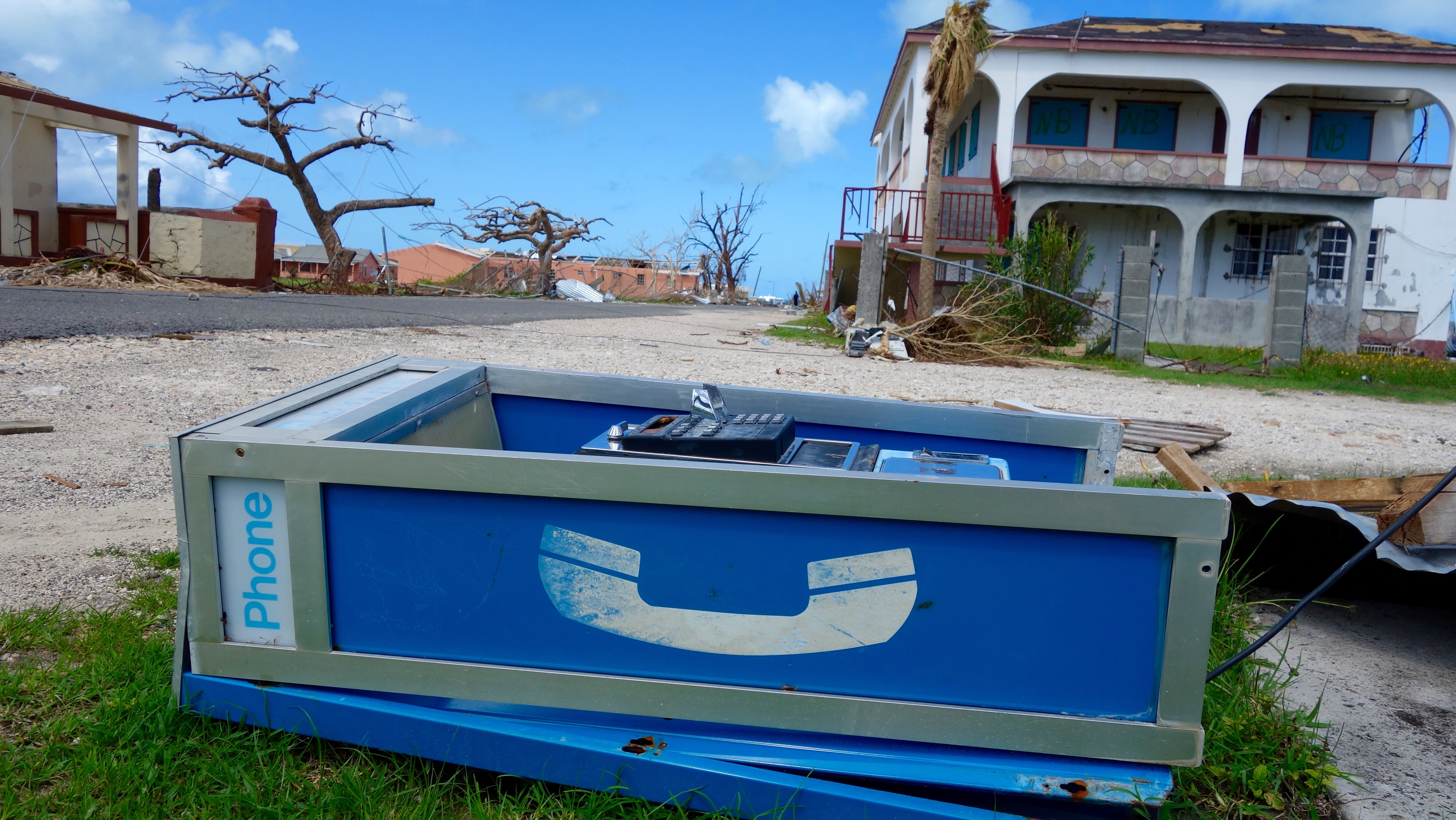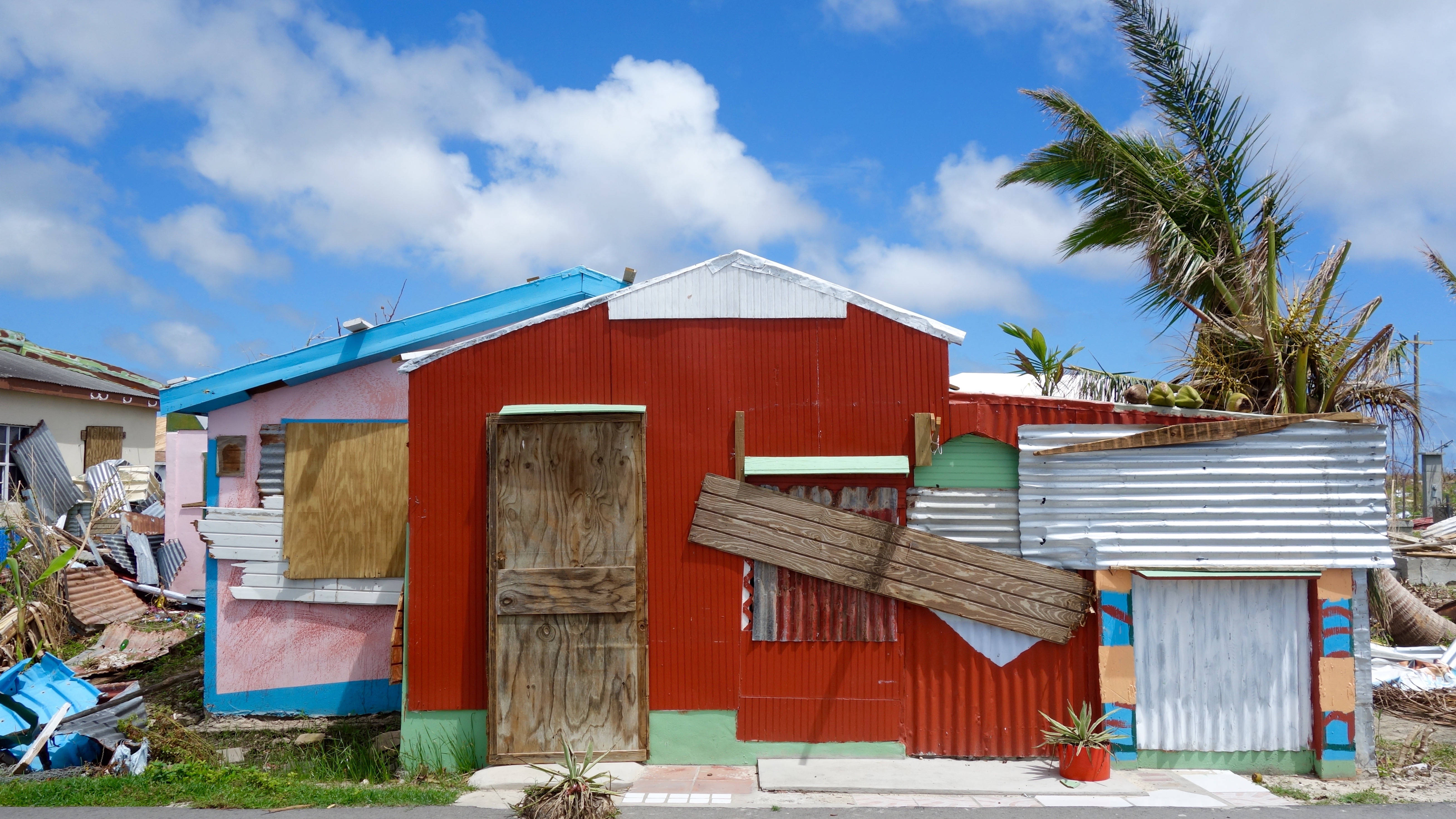Who owns Barbuda? Politicians and investors are taking advantage of the island’s devastation to grab land from people displaced by the recent series of hurricanes, residents and activists say.
Barbudan activists say their misery is being exploited in an opportunistic land grab. A luxury hotel plan backed by actor Robert De Niro and Australian casino mogul James Packer is a test case for diverging visions of Barbuda’s future.
Hurricane Irma smashed through the island on the night of 5 September, ripping off roofs, tearing down electricity lines, and blowing fishing boats into the trees. Over half the buildings will need significant repair, according to the government.
Under a state of emergency and disarray among the people and local representatives in the Barbuda Council, critics say the national government may try to overturn Barbuda’s unique communal land system.
The central government of the twin island nation of Antigua and Barbuda is proposing a form of land privatisation. Prime Minister Gaston Browne says the minority population of Barbuda can’t properly rebuild and develop without introducing private land ownership.
Speaking to IRIN, veteran Barbudan politician and activist Hilbourne Frank said the Antiguan-dominated government is using “underhand methods” to “compel” privatisation in the wake of the hurricane.
This means “serious trouble”, he said, and will threaten the cultural heritage of the island as well as Barbuda’s long-standing autonomy. “In the end, we are going to be controlled by other people,” he argued.
Dollar plots?
Browne proposes changing the law to privatise the land by selling it for a dollar a plot to current leaseholders. This, Browne argued in parliament last month, would help finance rebuilding by providing Barbudans the collateral for loans.
Critics say the real beneficiaries of such a move would be the commercial leaseholders of large plots such as those for hotels, some of which have never taken off. For example, according to local media, a side agreement assured De Niro and fellow investors in the Paradise Found project (promotional video here) they could convert their lease to outright ownership should the law change.
No land has been bought or sold on Barbuda since the abolition of slavery more than 180 years ago, possibly ever. Under current law, a local council leases Barbuda’s land to individuals or families who own the houses they build. “We dish it out as we see most suitable,” Frank explained.
The government estimate of the costs of reconstruction runs to over $200 million. Hurricane Irma left few buildings on Barbuda untouched. It trashed public infrastructure. A state of emergency was declared on 6 September. The entire population of some 1,800 was ordered off the island on the grounds of public health and safety. Since then, Barbudan evacuees have largely stayed with friends, relatives, and well-wishers on Antigua. Some live in public buildings and shelters.

The island values a leisurely tempo of life and has avoided the most intrusive and environmentally-damaging aspects of its sibling’s development, such as mass-market tourism. Its economy nevertheless depends on high-end tourism, fisheries, and the export of sand.
"I’m not running no giant welfare island over there"
Control of unspoilt Barbuda has been a key source of tension between the two islands, yoked together at independence in 1981.
Prime Minister Browne suggests Barbuda is “exclusively dependent” on Antigua. In an interview with VICE, he said: “I’m not running no giant welfare island over there.” But Barbudan activists say revenue from hotel leases and a notorious sand mining venture have flowed mainly to Antiguan coffers.
The elected Barbuda Council is the custodian of this unusual tradition of collective land control. Major commercial developments and leases require not only the approval of the council but popular support at a public meeting.
The centrepiece of the Paradise Found development is a 99-year lease and related tax breaks for as much as 859 acres of the island. De Niro has a minority interest alongside Packer, the primary investor. Changes to the law to fulfil the terms of the deal have been stalled by a legal challenge from Barbudans who say the $5.2 million deal undermines their land tenure and delivers little benefit to the islanders.
“Very serious matter”
Veteran British lawyer John Macdonald, speaking to IRIN from London, has represented Barbudans in many high-profile legal cases from the independence talks onwards, including opponents to the Paradise Found development.
Over the last 30 years, he said Antiguans had “continually tried to grab land on Barbuda”, and the 2007 Barbuda Land Act, which laid out specific rules on leasing and decision-making, had been intended to stem those moves.
Macdonald said any move now to change the common land ownership at the root of the Barbudan political settlement would be “a very serious matter”. He said it would be “very unfortunate” if the government were to use the hurricane “as an excuse for changing the land rights and positions”.

Macdonald said the islanders had shown themselves very tenacious, and a majority, he believed, supported keeping it “unspoilt”.
Barbudans aren’t united in one view, however. Notably, Arthur Nibbs, the sole member of parliament for Barbuda in the national assembly, has come out in favour of altering the 2007 act, at least to reduce the public consultation requirements.
In March, Barbuda elected a new 10-person council, which is deadlocked on the issue, and has been “spinning its wheels”, according to one observer.
Macdonald acknowledged that Barbuda needs new development planning but said any change in the land law would require the support of the council and the people in general, in a public forum. He said the hurricane should ideally provide an opportunity for people “to get together and… decide”.
Macdonald said even secession could become a live political issue if the dispute between Antigua and Barbuda was not resolved. To “tear up” the land issue would risk an attempt by some Barbudans to “go on their own again”. An online debate recently used the term Barbudexit for rumbling secessionist feelings.
Not far below the surface are feelings of superiority among Antiguans towards Barbudans, Frank said.
Macdonald cautioned that donors and investors presented with plans to Barbuda by the central government in Antigua should not “tie up some deal” without ensuring Barbudans’ consent.
It’s not necessarily the wrong time to revisit the land issue and to devise a future strategy, but it would be the wrong time, he said, “for the Antiguan government to try and grab the land”.
History
Barbuda makes up about 40 percent of the country’s 442 square kilometres but is flatter and less fertile than Antigua and holds only about two percent of the overall population. From the abolition of slavery in the 1830s, the island stayed broadly under various forms of British control and in loose affiliation with Antigua until independence in 1981.
Barbuda has been afflicted by a series of foreign adventurers, exploiters, and eccentrics over the centuries (its indigenous peoples were wiped out in the 1600s). For about 200 years, the Codrington family, under a lease from the British Crown, exploited slave labour on the island.
Now frail and in his eighties, Frank believes Barbuda’s unique land tenure can be traced back to the slave-owning Codrington family. He told IRIN the family sought to maximise its “pocket benefit” by setting aside a portion of the land for the slaves to farm, thereby maintaining a stronger and healthier workforce. Frank believes it was this move, however, that planted the idea of common land use on the island. Ironically, it was Codrington’s thirst for greater profits from his slaves that became a source of strength and self-determination. “Codrington gave them an inch, but they [the Barbuda slaves] took a mile… they took many miles… they took the whole island,” Frank said.
Legal challenges
In modern times, battles over land have been wrapped in the names of boutique resorts: Colourfully named offshore enterprises have included “The Dream Company” and “Peace Love and Happiness”. The island’s unspoilt isolation attracted less savoury characters: one American conman, Robert Vesco, tried to set himself up as the head of a “Sovereign Order of ‘New Aragon’ on half the island. Another investor with close connections to the then-ruling party was thwarted in a plan to establish a llama farm. The founder of the Paul Mitchell hair products brand also has a $200 million tourism project in the works.
Issues about land have ended up in court at least a dozen times since 1985. In 2000, the Commonwealth Secretariat sent a team to look into the “long-standing discord” and proposed new dispute resolution systems.
Serious legal challenges have revolved around who ultimately owns the land: the Barbudan people or the central government via the Crown (Britain’s monarch is the constitutional head of state). If the latter, the ruling Labour Party of Antigua and Barbuda could enact laws to bypass the Barbuda Council and weaken the requirement for popular consultations on land decisions.
The argument of ownership by the Crown is “a falsehood”, Frank told IRIN. Frank was a representative of the sceptical Barbuda community at the talks in London in 1981. The main concern, he recalled, was this: “All we want is our land to be owned by us.”
Barbuda’s experience is not unheard of in disaster literature. A USAID research note warns “... forms of dispossession like private land grabs and encroachment complicate post-disaster reconstruction.
“There is a high degree of confusion in the immediate wake of a disaster… Quite often, powerful real estate interests rush to fill these voids and acquire large tracts of land owned by vulnerable groups.”
Waiting
As the sun lowers, cricket practice begins at the Sir Vivian Richards Stadium near St. John’s, the capital of Antigua. In the stands, the thwack of willow on leather below is echoed by the clack of dominoes on tabletops.

Hermeta Thomas wants to go home. “We don’t feel comfortable in another man’s home,” she explains. Thomas also feels the damage had been blown out of proportion to suit a land grab. “We are at our weakest point now,” she says.
bp/ag






